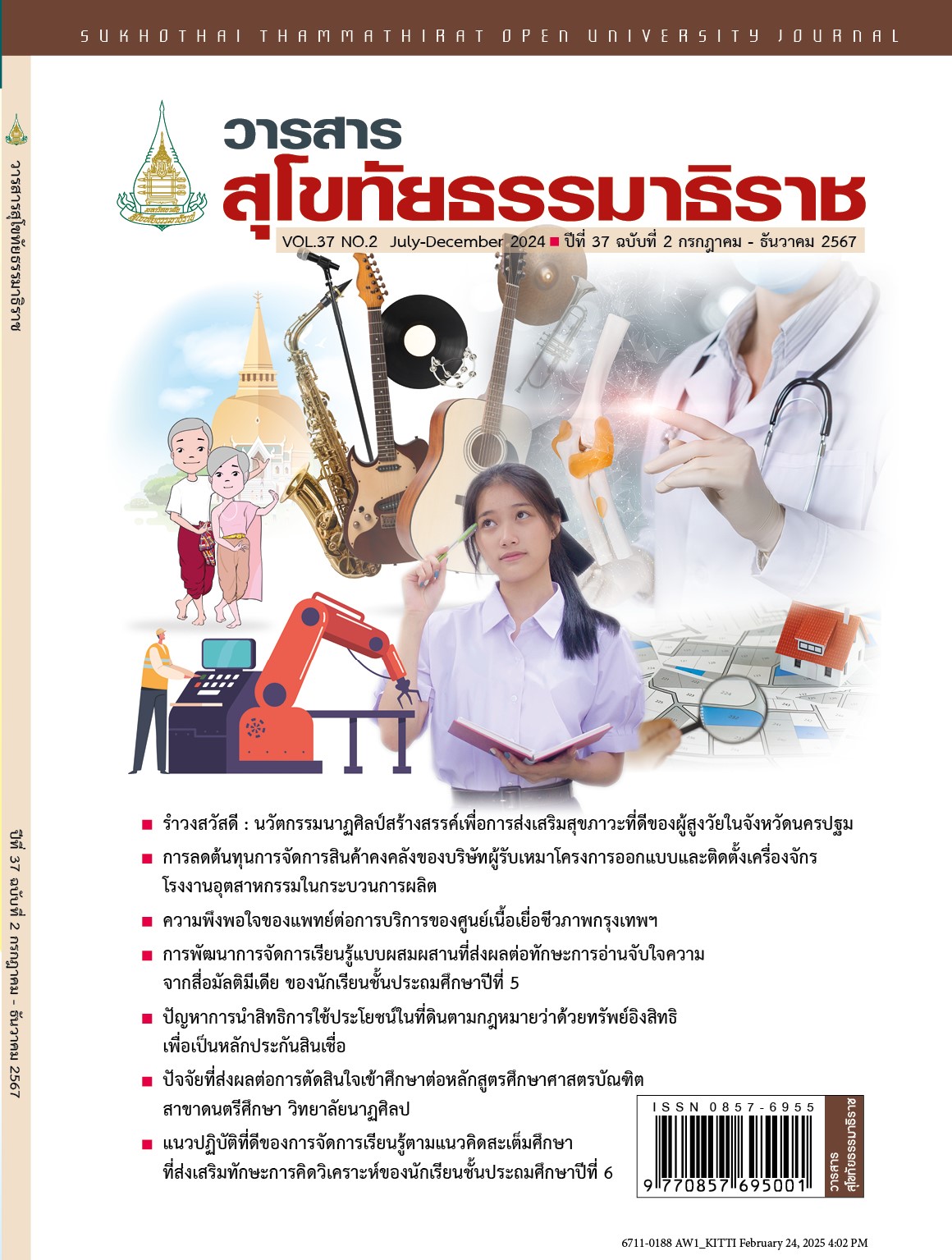แนวปฏิบัติที่ดีของการจัดการเรียนรู้ตามแนวคิดสะเต็มศึกษาที่ส่งเสริมทักษะการคิดวิเคราะห์ของนักเรียนชั้นประถมศึกษาปีที่ 6
คำสำคัญ:
แนวปฏิบัติที่ดี, ทักษะการคิดวิเคราะห์ , การจัดการเรียนรู้ตามแนวคิดสะเต็มศึกษา , การออกแบบเชิงวิศวกรรมบทคัดย่อ
การวิจัยครั้งนี้มีจุดประสงค์ 1) เพื่อหาแนวปฏิบัติที่ดี ผ่านการจัดการเรียนรู้ตามแนวคิดสะเต็มศึกษา เรื่อง หิน ที่พัฒนาทักษะการคิดวิเคราะห์ของนักเรียนชั้นประถมศึกษาปีที่ 6 2) เพื่อศึกษาทักษะการคิดวิเคราะห์ของนักเรียนชั้นประถมศึกษาปีที่ 6 หลังผ่านการจัดการเรียนรู้ตามแนวคิดสะเต็มศึกษา เรื่อง หิน และ 3) เพื่อเปรียบเทียบทักษะการคิดวิเคราะห์ ของนักเรียนชั้นประถมศึกษาปีที่ 6 ผ่านการจัดการเรียนรู้ตามแนวคิดสะเต็มศึกษา เรื่องหิน ก่อนและหลังเข้าร่วม กลุ่มเป้าหมายการวิจัยในครั้งนี้ คือ นักเรียนระดับชั้นประถมศึกษาปี ที่ 6 จำนวน 30 คน ที่เลือกแบบเจาะจง (Purposive Sampling) เครื่องมือที่ใช้ในการวิจัยครั้งนี้ ได้แก่ แผนการจัดการเรียนรู้ตามแนวสะเต็มศึกษา (STEM Education) ใบกิจกรรมสะเต็มศึกษาที่พัฒนาทักษะการคิดวิเคราะห์ และ แบบวัดทักษะการคิดวิเคราะห์ ทำการวิเคราะห์ ข้อมูลเชิงคุณภาพร่วมกับการวิเคราะห์เชิงปริมาณ ซึ่งสถิติที่ใช้ในการวิเคราะห์ข้อมูล คือ การหาค่าเฉลี่ย ส่วนเบี่ยงเบนมาตรฐาน และค่าร้อยละ ผลการวิจัยแสดงให้เห็นว่าการแนวคิดการเรียนรู้ผ่านปัญหากระตุ้นให้ผู้เรียนคิดวิเคราะห์และแก้ปัญหาผ่านสถานการณ์จริงสร้างโจทย์ที่เกี่ยวข้องกับชีวิตประจำวันของผู้เรียน เช่น ปัญหาสิ่งแวดล้อมในชุมชน และเปิดโอกาสให้ผู้เรียนตั้งคำถาม ค้นคว้า และทดลองด้วยตนเองโดยใช้กระบวนการทางวิทยาศาสตร์และวิศวกรรม หลังเข้าร่วมการจัดการเรียนรู้ตามแนวสะเต็มศึกษา นักเรียนมีทักษะการคิดวิเคราะห์รวมทั้ง 3 ด้าน มีค่าคะแนนเฉลี่ยสูงกว่าก่อนเรียนเท่ากับ 14.93 เมื่อพิจารณาทักษะการคิดวิเคราะห์ของแต่ละด้าน พบว่า ทุกด้านนักเรียนมีทักษะการคิดวิเคราะห์ที่มีคะแนนเฉลี่ยสูงขึ้นทั้งหมด ด้านวิเคราะห์เนื้อหา นักเรียนระบุข้อมูลสำคัญสรุปความรู้ให้เข้าใจง่ายถูกต้องชัดเจน ด้านวิเคราะห์ความสัมพันธ์ มีความสามารถ ในการหาความสัมพันธ์ของส่วนสำคัญต่าง ๆมากขึ้น ด้านวิเคราะห์หลักการ นักเรียนเชื่อมโยงสรุปความคิดรวบยอดเป็นหลักการได้ชัดเจนถูกต้องครบถ้วน ระหว่างการดำเนินกิจกรรมการเรียนรู้ตามแนวสะเต็มศึกษา นักเรียนมีการพัฒนาทักษะการคิดวิเคราะห์ที่เพิ่มขึ้นอย่างต่อเนื่องสูงสุดในกิจกรรมที่ 1.3 มีคะแนนเฉลี่ย 15.40 อีกทั้งนักเรียนชั้นประถมศึกษาปีที่ 6 ที่ได้รับการจัดการเรียนรู้ตามแนวทางสะเต็มศึกษา มีคะแนนทักษะการคิดวิเคราะห์หลังเรียนสูงกว่าก่อนเรียนอย่างมีนัยสำคัญที่ระดับ 0.1
เอกสารอ้างอิง
Boonliang Tumthong. (2021). The synthesis of STEM education instructional models through collaborative teaching and learning integration from local wisdom for basic education students. Journal of Educational Studies, Mahasarakham University, 15(2), 109-119.[in Thai]
Ceylan, S., & Ozdilek, Z. (2015). Improving a sample lesson plan for secondary science courses within STEM education. Procedia-Social and Behavioral Sciences, 177, 223-228.
Chuttharat Woranit, Parichat Prasertsang, & Surachai Rattanasuk. (2021). The development of problem-solving ability in science of Grade 6 students based on STEM education. Journal of Education, Mahasarakham Rajabhat University, 18(3), 169-178. [in Thai]
Institute for the Promotion of Teaching Science and Technology (IPST). (2014). STEM-Based Learning. Retrieved October 5, 2023, from Online Resource. [in Thai]
Kemmis, S., & McTaggart, R. (Eds.). (1988). The Action Research Planner (3rd ed.). Geelong, Victoria: Deakin University Press. rocks and their changes. Journal of Mahamakut Buddhist University, Roi Et Campus, 9(2), 506-518. [in Thai]
Manas Chuada. (2017). A study on the engineering design process of Grade 9 students on dissolved oxygen levels in water through STEM-based learning activities. [Master’s Thesis, Burapha University]. Online Resource. [in Thai]
Marisa Homduang, Somsiri Singlop, & Chet Sirisawat. (2020). The effects of STEM-based learning on problem-solving thinking and learning achievement of Grade 11 students. Journal of Educational Studies, Burapha University, 32(1), 61-76. [in Thai]
Mayurachat Phuaondee. (2021). The development of project-based learning activities to promote analytical thinking on the suff iciency economy in the social studies, religion, and culture subject for Grade 11 students. Journal of KSP Educational Innovation, 2(2), 35-44. [in Thai]
Montri Wongsapan. (2013). Enhancing learning through analytical thinking processes. Journal of Educational Studies, Thaksin University, 13(2), 125. [in Thai]
Pimphan Dechakup & Phayao Yindeesuk. (2014). Learning Management in the 21st Century. Chulalongkorn University Press. [in Thai]
Sarican, G., & Akgunduz, D. (2018). The impact of integrated STEM education on academic achievement, reflective thinking skills towards problem-solving, and permanence in learning in science education. Cypriot Journal of Educational Sciences, 13(1), 94-113.
Sunisa Pangwiset & Prasat Nueangchaloem. (2019). The development of analytical thinking in Grade 5 students through STEM-based learning. Journal of Roi Et Rajabhat University,13(3), 184-195. [in Thai]
Triprasert Saengsriuang, Aran Suikraduang, & Phongsakorn Pimpanich. (2019). The development of a science activity package based on STEM education concepts on rocks and their changes. Journal of Mahamakut Buddhist University, Ro i Et Campus, 9(2), 506-518.
ดาวน์โหลด
เผยแพร่แล้ว
รูปแบบการอ้างอิง
ฉบับ
ประเภทบทความ
สัญญาอนุญาต
ลิขสิทธิ์ (c) 2025 มหาวิทยาลัยสุโขทัยธรรมาธิราช

อนุญาตภายใต้เงื่อนไข Creative Commons Attribution-NonCommercial-NoDerivatives 4.0 International License.
บทความที่ได้รับการตีพิมพ์เป็นลิขสิทธิ์ของวารสารมหาวิทยาลัยสุโขทัยธรรมาธิราช
ข้อความที่ปรากฏในบทความแต่ละเรื่องในวารสารวิชาการเล่มนี้เป็นความคิดเห็นส่วนตัวของผู้เขียนแต่ละท่านไม่เกี่ยวข้องกับมหาวิทยาลัยสุโขทัยธรรมาธิราช และคณาจารย์ท่านอื่นๆในมหาวิทยาลัยฯ แต่อย่างใด ความรับผิดชอบองค์ประกอบทั้งหมดของบทความแต่ละเรื่องเป็นของผู้เขียนแต่ละท่าน หากมีความผิดพลาดใดๆ ผู้เขียนแต่ละท่านจะรับผิดชอบบทความของตนเองแต่ผู้เดียว
ห้ามนำข้อความทั้งหมด หรือบางส่วนไปพิมพ์ซ้ำ เว้นแต่จะได้รับอนุญาตจากกองบรรณาธิการวารสาร



